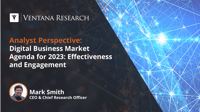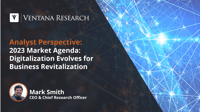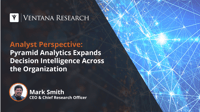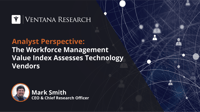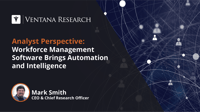Having just completed the 2023 Ventana Research Value Index for Product Experience Management, I want to share some of my observations about how the market has advanced over the last two years. The product information management software market is quite mature and products from any of the vendors we assess could be used to effectively deliver information to help your organization improve its operations. But as we established the definition of product experience management (PXM), the...
Read More
Topics:
Marketing,
Product Information Management,
Operations & Supply Chain
Having just completed the 2023 Ventana Research Value Index for Product Experience Management, I want to share some of my observations about how the market has advanced over the last two years. The product information management software (PIM) market is quite mature and products from any of the vendors we assessed can be used to effectively deliver information to help your organization improve its operations. But as we established the definition of product experience management (PXM), the...
Read More
Topics:
Marketing,
Product Information Management,
Operations & Supply Chain
With Ventana Research’s 2023 Market Agenda, we continue the guidance we’ve offered for two decades to help organizations derive maximum value from digital business technology investments. Through our market research and expertise, we identify trends and best practices and share insights on how to achieve technological effectiveness, particularly in key processes and systems to engage the workforce.
Read More
Topics:
Performance Management,
Business Continuity,
Digital transformation,
Digital Business,
Digital Security,
Digital Communications,
Work Management,
Experience Management,
Governance & Risk,
Sustainability & ESG
Ventana Research has announced its market agenda for 2023, continuing a 20-year tradition of credibility and trust in our objective efforts to educate and guide the technology market. Our research and insights are backed by our expertise and independence, as we do not share our Market Agenda or our market research – including analyst and market perspectives – with any external party before it is published. We continuously refine our Market Agenda throughout the year to ensure we offer the...
Read More
Topics:
Customer Experience,
Human Capital Management,
Marketing,
Office of Finance,
Analytics,
Data,
Digital Technology,
Operations & Supply Chain,
Digital Business,
Office of Revenue
In today’s organization, the myriad of analytics and permutations of dashboards challenge workers’ ability to take contextual actions efficiently. Unfortunately, conventional wisdom for investing in analytics does not recognize the benefits of empowering the workforce to understand the situation, examine options and work together to make the best possible decision.
Read More
Topics:
business intelligence,
Analytics,
Data,
Digital Technology,
Digital Business,
AI & Machine Learning,
Analytics & Data,
Analytic Data Platforms
The management of work is a focal point for every organization that has people and resources directed to accomplish the smallest to largest of tasks. But many organizations are not easily able to manage complex activities because the details of how people are assigned and complete work are not as simple as they should be. Traditional project management methods and technologies have failed to work in an enterprise manner, so new approaches have emerged to meet today’s challenges. The essence of...
Read More
Topics:
Digital Business,
Work Management
The technology industry has established itself as a pivotal force in its ability to help organizations become more intelligent and automated. But doing so has required a journey of epic proportions for most organizations that have had to endure a transition of competencies and skills that was, in many places, transitioned to consulting firms who were hired appropriately to manage changes. Unfortunately, this step led, in many cases, to an extended focus on digital transformation rather than the...
Read More
Topics:
Customer Experience,
Human Capital Management,
Marketing,
Office of Finance,
Analytics,
Data,
Digital Technology,
Operations & Supply Chain,
Digital Business,
Office of Revenue
Pressures to engage consumers through every interaction and provide a delightful customer experience are influencing advancements in business and technology. Organizations are challenged to manage friction points experienced by billions of consumers amid expanding digital channels. These issues must be addressed to engage and respond to customers every second of the day.
Read More
Topics:
Customer Experience,
Contact Center,
agent management,
Digital Business
I am happy to share insights gleaned from our latest Value Index research, an assessment of how well vendors’ offerings meet buyers’ requirements. The Ventana Research Value Index: Workforce Management 2022 is the distillation of a year of market and product research by Ventana Research. Drawing on our Benchmark Research, we apply a structured methodology built on evaluation categories that reflect the real-world criteria incorporated in a request for proposal to workforce management vendors...
Read More
Topics:
Human Capital Management,
Learning Management,
Talent Management,
Workforce Management,
Payroll Management,
Total Compensation Management,
employee experience
Workforce management processes and activities, a major focus of investment and optimization efforts for decades, have undergone a huge transformation in recent years. In our view, this is mostly a function of two significant trends: the explosion of technology innovation associated with the use of artificial intelligence, machine learning and embedded analytics in many areas of a business including a range of human capital management processes and operations; and a major reframing of the...
Read More
Topics:
Human Capital Management,
Learning Management,
Talent Management,
Workforce Management,
Payroll Management,
Total Compensation Management,
employee experience



